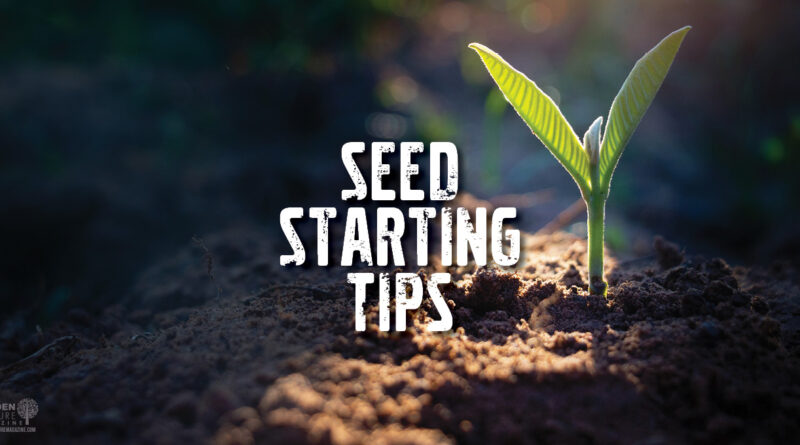Seed Starting Success Guide | Garden Culture Magazine
A sunny windowsill, some patience, and a few seed-starting tips are all you need to get a jump on the growing season. We’re here to answer some of your most-asked questions so you can start your best garden ever!
When should I sow seeds indoors for planting outside?
Most seeds germinate within two weeks of sowing and will be ready to plant outdoors approximately six weeks afterward. So the best rule of thumb is to determine the last frost date in your area and count six to eight weeks back for seed starting.
What containers will I need for seed starting?
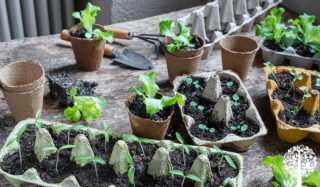
Most garden centers and big box stores sell plastic seed trays. But some of the best seed-growing containers are found in the recycle bin. For example, egg cartons, newspapers, and old toilet rolls are great for starting seeds.
What growing medium should I use?
A lightweight, loamy growing medium that slowly releases water is ideal for starting seeds. Specialized seed starting mixes are available at local garden centers, along with peat moss or coconut coir seed starting pellets. Soak the pellet until it expands, poke a hole into the middle, and add the seed. Alternatively, you can make your seed starting mix using equal parts of perlite, vermiculite, peat moss, or coconut coir. Always remember to label your seeds at the time of planting. Most sprouts will look alike, and mixing cabbage with cherry tomatoes is easy.
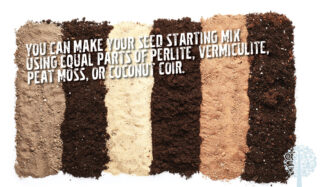
How much water, light, and warmth do seeds need?
Most seeds need 10-14 hours of light daily and temperatures between 15-20°C to germinate. A sunny windowsill and a basic grow bulb in a lamp with a flexible arm (a small desk lamp, for example) will do the trick.
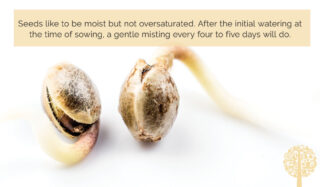
Seeds like to be moist but not oversaturated. After the initial watering at the time of sowing, a gentle misting every four to five days will do. The key is never to let the soil dry out. Covering your seeds with a transparent cover 2-3 cm above the seed pot creates a greenhouse effect that adds warmth and circulates moisture.
Do all seeds need to be soaked?
Immersing seeds in warm water for 18-24 hours before planting softens the outside husk and helps germination. But not all seeds require soaking. The seed packet will tell you what you need to know. If sharing seeds with a friend, ask them to write out sowing and planting instructions to keep in your garden journal for next year.
When do the sprouts get thinned?
When the seeds are 10-15 cm tall, thin them out, leaving only one or two in the same container. If several seeds are planted together and remain in the same receptacle, they will begin to compete for resources such as water and light. I hate discarding the thinned baby sprouts, so I carefully re-pot them into another receptacle using the same growing medium.
How do I know if the seeds are germinating?
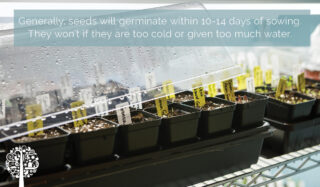
Generally, seeds will germinate within 10-14 days of sowing. They won’t if they are too cold or given too much water. If they’re growing tall quickly, this may mean they don’t have enough light and are reaching toward the little bit available. As a result, the stems won’t be strong enough to hold the tops, and the sprout won’t survive.
When should I plant my seedlings outdoors?
Once the sprouts have three or four good-sized leaves, and the risk of frost has passed, they can go outside.
Remember, they’ve been warm and cozy inside their whole lives, and being thrust into the ground all at once is the equivalent of stepping into a cold shower. They will go into shock! Begin by taking the sprouts outside for a few hours, increasing the time every day. Once you can leave them out overnight for a few days, it’s time to plant them in the ground and watch them grow even bigger. It’s that easy!

